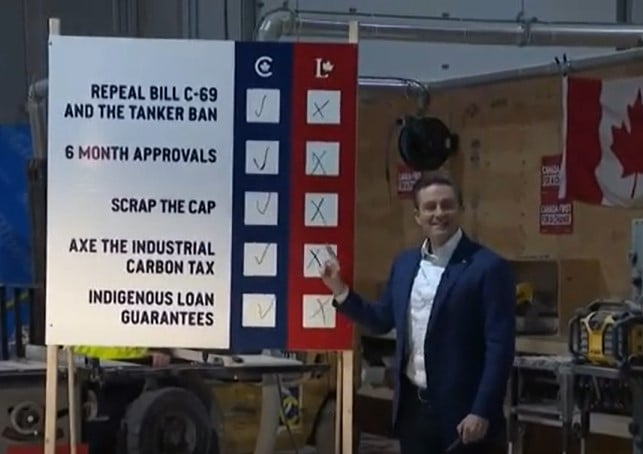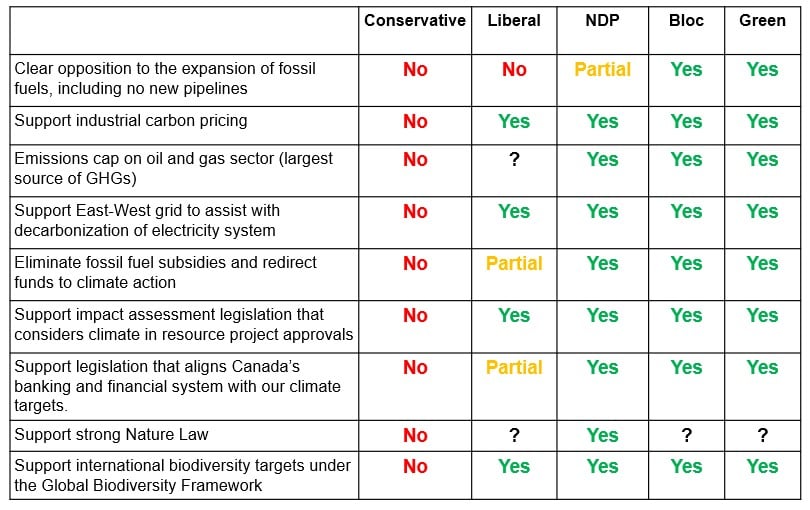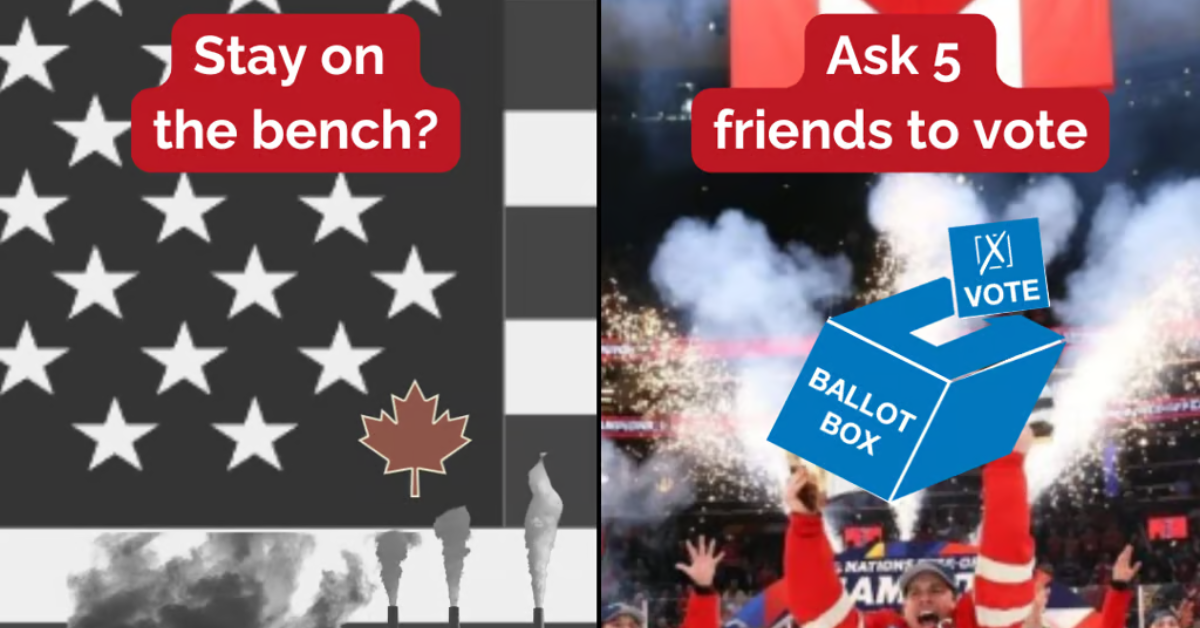One of the remarkable aspects of this election is that the Conservative Party is bragging about how eager they are to do exactly what Big Oil tells them to do. They literally put out a press release saying they will comply with all of the demands coming from oil CEOs and challenged the Liberals to do the same.

Image from CTV News broadcast
Poilievre was responding to an open letter sent by 14 oil and gas CEOs demanding that Canada declare a “national energy emergency” in order to justify eliminating key environmental protections.
Declaring an energy emergency to bypass due process is, of course, straight out of the Trump playbook for boosting fossil fuels and kneecapping their clean energy competitors. Trump made waves during the U.S. election campaign by demanding a billion dollars to grant the oil lobby’s wishes. Ultimately, oil companies and executives donated over $170 million to Republican candidates and their conservative allies (compared to only $1.4 million to the Democratic side), but Trump probably thought that was a decent down payment.
Poilievre, by comparison, is a cheap date. The Conservative Party organized a merely $1650/plate fundraiser where top oil executives got private time with Poilievre. (Thankfully, Canada has much stricter laws on political donations, and if you want to know why we should keep it that way, check the documentaries: Dark Money, Citizens United, The Great Hack and The Dark Money Game).
The Canadian oil lobby is seeking to replicate in Canada the gains they are winning from Trump. In their open letter, they demanded that the federal government:
- Eliminate the industrial carbon price (which is projected to be the single largest driver of greenhouse gas reductions in Canada in the near-term).
- Repeal the Impact Assessment Act (which for the first time made climate change a consideration in energy project approvals) and the Oil Tanker Moratorium Act (which bans large oil tankers along British Columbia’s north coast).
- Abandon the proposed oil and gas emissions cap.
- “Streamline” regulations (code for deregulation).
- Put a six month time limit on approvals (which would almost certainly violate Indigenous rights to free, prior and informed consent).
That letter was signed by such notable patriots as the CEOs of the Canadian arm of ExxonMobil and TC Energy. TC Energy used to be called TransCanada before it moved its headquarters to the United States, where it has very close ties to the Trump Administration:
“TC Energy is intimately tied to the Trump administration, including family members and former colleagues. Michael Waltz, the Trump National Security Advisor, who accidentally added an Atlantic journalist to a Signal chat about Yemen strike plans, is married to TC Energy’s Julia Nesheiwat, who is also a former Trump Homeland Security advisor.
On Canada becoming the 51st state, Waltz said that “many Canadians want to be Americans.” We can only hope that any resource takeover plans will be leaked on a Signal group chat. Waltz hasn’t hesitated to involve himself in Canadian politics, publicly supporting Conservative Party Leader Pierre Poillievre to be prime minister.” (source)
Capitulating to Big Oil’s demands to Drill Baby Drill makes Canada more vulnerable to Trump – not less. Canada is part of Trump’s energy dominance strategy and Pierre Poilievre would make the stars align for him.
In the French-language election debate last night, Poilievre doubled down on his desire to expand oil and gas production. He didn’t acknowledge Indigenous rights, but instead spoke of “majority rule” when it comes to building pipelines; speaking of majority rule is never a good sign when you are asked about respecting fundamental rights.
While Poilievre wants to emulate Trump, Mark Carney appears to be modeling himself on 2008-era Obama’s “all of the above” energy strategy: say yes to both fossil fuels and renewables. In the debate, he came out solidly in favour of expansion of the oil and gas industry including new pipelines (ugh), but seemed to say that they wouldn’t force a pipeline to be built over objections from provincial governments or Indigenous communities. He also said the oil would have to be lower carbon through (for example) carbon capture and storage. The Liberals have elsewhere indicated they’d keep the industrial carbon price and a cap (of some kind) on oil and gas emissions.
The Bloc Quebecois was the only party on stage (the Greens were disinvited) that unequivocally rejected fossil fuel expansion and new pipelines, arguing that we need to rapidly transition to renewables. NDP leader Jagmeet Singh didn’t really answer the question on pipelines or expanding fossil fuels, but did reference the need to switch to renewables and build a pan-Canadian electricity grid, while reminding viewers of the heartbreaking costs of climate change-fueled unnatural disasters.
The surprising thing about Carney’s “all of the above” positioning is that he understands the economic risk we would be taking by deepening our reliance on fossil fuels. The U.S. under Trump is trying to expand oil and gas production and consumption, but they are an unreliable market. Meanwhile Europe, China and much of the rest of the world are transitioning to renewable energy to fight climate change and reduce their exposure to oil and gas supplies being used as a weapon by Putin or Trump. Thanks to those efforts, the International Energy Agency is projecting that oil demand will peak long before we could get new pipelines built, so expanding oil and gas production would leave us even more dependent on the U.S. market.
In short: Trying to out-Trump Trump by giving in to Big Oil’s demands would be an act of economic and environmental arson, not to mention put Canada’s sovereignty in more jeopardy. Going the route of Big Oil would mean putting elbows down – not up.



